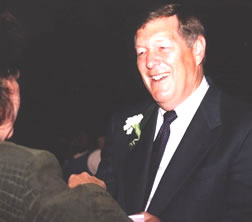|
As Ambassador Robert A. Seiple spoke with passion and conviction
to the Prayer Breakfast crowd May 7 at Stouffer's Battle Creek hotel,
he made his audience laugh, brought a tear to more than one eye, and
left listeners thinking about what their own faith really means, especially
when confronted by religious persecution.
Ambassador Seiple spent 11 years as the president of World Vision,
the largest privately-funded relief and development agency in the world.
He then worked for two years in the State Department as its first-ever
Ambassador-at-Large for International Religious Freedom, a position
created by the International Religious Freedom Act of 1998.
Today, Seiple is the president and founder of the Institute for Global
Engagement based at Eastern University in Pennsylvania. The Institute,
with a staff of only six, works to create sustainable environments for
religious freedom throughout the world. It also has as a goal, giving
emerging leaders faith-based tools for carrying out their roles as leaders.
One of the things, the Institute will be doing in the next few weeks
for example, is bringing to the United States, a group of communist
leaders to see how the United States is able to function when people
have the freedom to speak, worship, and pursue individual goals. Simultaneously,
another group of leaders will be given training in the principles of
faith-based leadership.
Seiple began his remarks as keynote for the Prayer Breakfast by telling
the audience of about a thousand, of a best friend, Jim, with whom he
shared the dream of one day opening a game preserve. They talked of
their dreams during their service in Vietnam and it was there that
in 1968 his friend was shot down near the border of Cambodia.
"I went over everything we said and did and planned but I had never
once told Jim about Jesus Christ," Seiple said. "I considered
myself a Christian. I believed privately and thereupon obscured it for
everyone else. The day of grace is not forever. This is a story
of lost opportunity."
Like Officer Brandon Hultink, who also spoke at the Prayer Breakfast,
Seiple was confronted by the possibility of death, in his case he knew
that death would likely come at 10:20 p.m. when he was assigned to fly
a bombing mission over Hanoi from which, in all likelihood, he would
not return. "I was gripped by a paralyzing fear. I wish I had
a dollar for every time I had stood on my spiritual tiptoes and said
I wasn't afraid to die. We can do that only because we don't know
when that time comes." But when he knew it would probably be at
10:20 p.m. that very night the tiptoes he might have tried to stand
on were trembling. Only because the advance aircraft had radar problems
was the mission scrapped and his life saved. "I don't use the rhetoric
of faith lightly anymore," he admitted. "You haven't lived
until you have had a crisis of faith."
He went on to talk about some of the people he has met throughout the
world who have suffered horrifically for their beliefs, among them,
a Lebanese woman named Mary whose face was forever scarred and who suffers
paralysis because she refused to denounce Jesus and was shot in the
head by her persecutor. "Faith is indelibly scarred into her,"
he said, yet she would like to meet the man who committed this atrocity
in order to tell him she forgives him.
He told of a Chinese couple, one who has served 10 years in prison and
the other 20 years, for their faith in God, pointing out that he himself
has never had to suffer persecution anything remotely like these and
others have. He has stood on a bridge in Rwanda and watched as bodies
floated underneath like so much fallen timber. There were bodies that
had been dead for days, decapitated bodies, and children among the bodies
of murdered adults.
"I needed God's proof of what this meant as the bodies gathered
in the eddies behind the waterfall. A rainbow stood over the mist of
the falls and that said to me that even in this horror, evidence of
God's grace abounds."
Ambassador Seiple challenged his audience to look at their own values
when he said, "Americans are persecuted by our own materialism-blatant
consumerism and misplaced values." As he concluded his remarks
he reminded his audience of his friend's death at the age of 25 and
the opportunity he had missed to share words of faith. "Grace is
not forever," he said.
|


